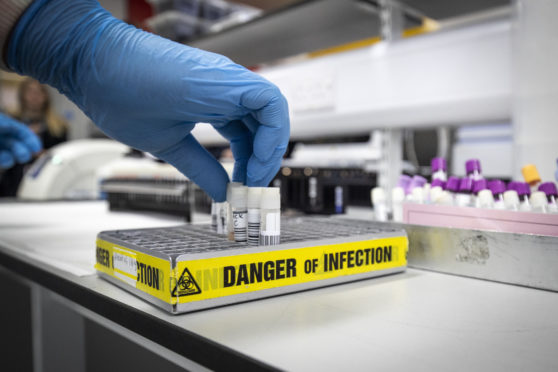
Research into some of the UK’s deadliest diseases is being “devastated” by the Covid-19 pandemic, leading charities have warned.
The Association of Medical Research Charities (AMRC) warned that medical research is being hampered by the economic challenges posed by coronavirus.
Many charities have described huge losses in income as they warned that research efforts could be impacted for years to come.
The impact of the crisis could lead to a “stall” in making the discoveries that patients “urgently need”, experts said.
Even with “best efforts” to save costs – such as putting staff on furlough and charity employees taking pay cuts – there are still major shortfalls in cash among the sector.
Fundraising events have been called off and charity shops have been shut for months which has caused a “big blow” to the income of charities.
As a result, some research into illnesses including heart disease, cancer and Parkinson’s disease have been put on pause.
Even with “best efforts” to save costs – such as putting staff on furlough and charity employees taking pay cuts – there are still major shortfalls in cash among the sector.
The AMRC is leading a call for the Government to commit to a matched funding agreement to put the sector on stable footing.
In the first year it is calling for a cash boost of £310 million.
Such a boost could put medical research “back on track” and mitigate some of the risks faced by the charities, said Michelle Mitchell, chief executive of Cancer Research UK.
“We are facing a precipice here, we do not want to make the cuts we may be compelled to make,” she said.
Aisling Burnand, chief executive of the AMRC said: “The current pandemic has put the future of charity funded research at significant risk.
“The impact of the pandemic will be felt by medical research charities and their communities and their supporters for many years to come.
“We can see the impact of the pandemic is immediate and will have significant long term repercussions.”
The AMRC said that last year medical research charities spent an estimated £1.9 billion in the UK.
This year it has estimated a 41% decrease spend in charity medical research.
“And we estimate it will take approximately four and a half years for spending to return to last year’s levels,” said Ms Burnand.
“Four and a half years is a long time for anyone with a life-limiting or life-shortening condition.”
She added: “I can’t begin to express what this means for patients across the UK waiting, another four and a half years, could be the difference between severe and non-reversible deterioration, or death. It’s absolutely devastating.”
At the end of April almost three quarters (74%) of clinical trials and studies funded by AMRC charities had been paused.
As lockdown has eased some have resumed, but the AMRC said that some will never restart.
Dr Charmaine Griffiths, chief executive of the British Heart Foundation (BHF), said: “We now face an unprecedented research funding crisis, one that threatens to arrest the progress made in tackling heart and circulatory diseases that sadly still kill one in four people.
“And we anticipate that such a sharp fall could have a catastrophic impact on UK cardiovascular research.”
She added: “So I think the shock waves from such a drop in funding for heart and circulatory disease will be profound and stalled progress in making the discoveries that patients urgently need.”
The BHF is losing £10 million a month at present, she added, even with support from the furlough scheme.
Cancer Research UK said that the impact on cancer patients could be “significant”.
The charity has said that it may be forced to cut £150 million per year from its research funding.
It said that this could set back the progress made in survival for people with cancer.
Ms Mitchell said: “We have been massively hit by Covid-19, as our fundraising efforts have been hugely restricted. We have been doing everything possible to limit the impact. But without a way to bridge this funding gap, we will have to make radical decisions about cutting lifesaving research.
“Ultimately, it will be patients who will suffer the consequences, which is heartbreaking.
“It is imperative that the Government urgently works with medical research charities to come to a solution, so that decades of investment in UK research is not lost in a matter of months.”
She added: “We don’t want to make catastrophic cuts to research which could last a decade.”
Steve Ford, chief executive of Parkinson’s UK, added: “The pressures of this pandemic are being felt across the research world.
“While our agile approach has meant we have been able to continue with some of our projects, inevitably others have been put on hold and without further investment, the future of Parkinson’s research will be heavily impacted.”

Enjoy the convenience of having The Sunday Post delivered as a digital ePaper straight to your smartphone, tablet or computer.
Subscribe for only £5.49 a month and enjoy all the benefits of the printed paper as a digital replica.
Subscribe